- Create new account
- Reset your password
Register and get FREE resources and activities
Ready to unlock all our resources?
- William Shakespeare
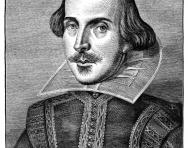

Who was William Shakespeare?
William Shakespeare is a famous British playwright , which means he’s someone who wrote plays. Shakespeare is considered to be one of the most talented writers of all time.
Shakespeare lived around the late 16th century and early 17th century, and in between the reigns of Queen Elizabeth I and King James I. Both of them saw some of the plays he wrote, which are still performed today. Some of the phrases that Shakespeare wrote have even become part of our everyday language!
Top 10 facts
- William Shakespeare was born in Stratford-upon-Avon in April 1564.
- Shakespeare’s wife’s name was Anne Hathaway.
- Shakespeare had three children: Susanna, Hamnet and Judith.
- Shakespeare worked as actor with the Lord Chamberlain’s Men, later called the King’s Men.
- Shakespeare wrote 154 sonnets and around 40 plays.
- One of Shakespeare’s first plays was Henry V .
- Shakespeare’s plays were performed for both Queen Elizabeth I and King James I – James I was the patron of Shakespeare’s theatre group.
- Shakespeare’s theatre group performed in the Globe Theatre and the Blackfriars Theatre.
- Some phrases that Shakespeare wrote in his plays are things we still say today.
- 1564 William Shakespeare was born in Stratford-upon-Avon
- 26 April 1564 Shakespeare was baptised
- November 1582 Shakespeare married Anne Hathaway
- 1592 This is the earliest time when records show that Shakespeare was in London
- 1593 Shakespeare’s first poem was published, and his plays started to be performed by different theatre groups in London

- 1603 James I was crowned king, and Shakespeare’s theatre group was renamed the King’s Men when the King became their patron
- 1604-1605 The King’s Men performed seven of Shakespeare’s plays for King James I
- 1609 Shakespeare’s sonnets were published

- 23 April 1616 William Shakespeare died
- 1623 The first collection of Shakespeare's work was published, called The First Folio

Boost Your Child's Learning Today!
- We'll created a tailored plan for your child...
- ...and add English & maths activities to it each week...
- ...so you can watch your child grow in skills & confidence
Did you know?
- We don’t know the date that William Shakespeare was born – we just know the date that he was baptised.
- Shakespeare had three children named Susanna, Hamnet and Judith. Hamnet and Judith were twins.
- Before Shakespeare wrote plays, he worked as an actor with the Lord Chamberlain’s Men.
- The Lord Chamberlain’s Men changed its name to the King’s Men in 1603, which is when James I was crowned king and became the group’s patron.
- Shakespeare wrote both poems and plays – he started out by writing poems first.
- Most of the poems Shakespeare wrote are called sonnets . He wrote 154 sonnets!
- Shakespeare is sometimes called ‘The Bard of Avon’ – a bard is another word for a poet.
- Shakespeare wrote almost 40 plays; someone who writes plays is also called a playwright.
- Not a lot of people could read and write in Shakespeare’s time, so the Globe Theatre hung different coloured flags to let people know when a play was going to be performed, and what kind of play it was going to be (if it was sad or funny).
- The Globe Theatre was shaped like an octagon – it had eight sides.
- Women didn’t act in Shakespeare’s time, so boys would have to play the roles of women. That means that Juliet in Romeo and Juliet would have been played by a boy!
Look through the gallery and see if you can spot all the following:
- Anne Hathaway's Cottage
- A statue of Shakespeare
- Mary Arden was Shakespeare's mother; visitors can still see her childhood home today
- William Shakespeare’s birthplace
- William Shakespeare’s grave (Photo Credit: Elliott Brown)
- A drawing of what Shakespeare’s Globe Theatre would have looked like
- A replica (copy) of Shakespeare’s Globe Theatre, which was built in London in 1997
- The stage in the Globe
- The Royal Shakespeare Theatre in Stratford

Even though they lived in Stratford-upon-Avon, William Shakespeare and Anne Hathaway were married in a village called Temple Grafton. At some point between 1585 and 1592, Shakespeare moved to London . His wife and children were still in Stratford-upon-Avon, and Shakespeare didn’t move back there until 1611.
Shakespeare mostly wrote plays and sonnets, which are a kind of poem. Sonnets have 14 lines with 10 syllables in each line.
Shakespeare’s theatre group, The King’s Men, worked in two theatres, the Globe and the Blackfriars. The Globe Theatre didn’t have a roof on it, but the Blackfriars Theatre did so it could be used when the weather got cold. Seeing a play at the Globe Theatre was comfortable if you could pay for a seat with a cushion, but if you paid just one penny you could stand in the middle.
Actors in Shakespeare’s time had a bad reputation – people thought they weren’t very nice people, and couldn’t be trusted. So, groups of actors – called troupes – tried to get someone rich to sponsor them. This sponsor would give them money and things that they needed. Shakespeare’s theatre group would have had to show people a piece of paper with their sponsor’s name written on it if they wanted to be welcomed somewhere.
Shakespeare was part of The Friday Club , a group for actors, poets, authors and playwrights (like Shakespeare). The explorer Sir Walter Raleigh began the group in 1603, and they all met in the Mermaid Tavern, so they sometimes called themselves the Mermaid Club.
Shakespeare wrote three different kinds of plays – comedies (funny plays), tragedies (sad plays) and histories (plays about a real person). A different colour flag would be flown from the top of the theatre so people would know which play was about to be performed – white meant a comedy would be performed, red a history, and black or dark colours meant a tragedy.
Shakespeare’s comedy plays are: All's Well That Ends Well, As You Like It, The Comedy of Errors, Cymbeline, Love's Labour's Lost, Measure for Measure, The Merchant of Venice, The Merry Wives of Windsor, A Midsummer Night’s Dream, Much Ado About Nothing, Pericles, Prince of Tyre, Taming of the Shrew, The Tempest, Troilus and Cressida, Twelfth Night, Two Gentlemen of Verona and A Winter's Tale.
Shakespeare’s tragedy plays are: Antony and Cleopatra, Coriolanus, Hamlet, Julius Caesar, King Lear, Macbeth, Othello, Romeo and Juliet, Timon of Athens and Titus Andronicus.
Shakespeare’s history plays are: King Henry IV Part 1, King Henry IV Part 2, King Henry V, King Henry VI Part 1, King Henry VI Part 2, King Henry VI Part 3, King Henry VIII, King John, Richard II and Richard III.
Shakespeare wrote his sonnets and plays around 400 years ago, but some of the phrases he wrote have become a part of our everyday language. For instance, you might have heard someone in trouble say that they’re ‘in a pickle’, or heard being jealous described as ‘the green-eyed monster’.
Famous friends:
Sir Walter Raleigh (c.1552 – 1618) – Sir Walter Raleigh visited America and helped start colonies there, and some people think that he was the first one to bring tobacco and potatoes into England. He also founded the Friday Club in 1603, which was a group for poets and playwrights that Shakespeare belonged to.
Ben Johnson (1572-1637) – Ben Johnson wrote plays and poems around the same time that Shakespeare did. Both he and Shakespeare belonged to the Friday Club that Sir Walter Raleigh began. Ben wrote a poem in the introduction of Shakespeare’s First Folio, which is the collection of works that was published a few years after Shakespeare died.
Henry Wriothesley, Earl of Southampton (1573-1624) – Henry Wriothesley was a wealthy man, and the patron of William Shakespeare. He loved the theatre and plays.
Richard Burbage (1568-1619) – Richard Burbage was a famous actor, and part of William Shakespeare’s theatre group. He often played the lead role in Shakespeare’s plays.
Christopher Marlowe (1564-1593) – Christopher Marlowe was born the same year as Shakespeare, and also famous for writing plays. Shakespeare didn’t start writing plays and having them performed until after Christopher Marlowe died.
Related Videos
Just for fun...
- Find Shakespeare wordsearches, comic strips, puppet-making, worksheets and more on the Shakespeare Week website
- Watch Horrible Histories Shakespeare songs: List of Plays 'wot I've Written and Shakespeare and the Quills Song
- Go Totally Shakespeare with CBBC! Complete quizzes, watch funny clips and find the best Shakespeare facts
- Download some Shakespeare-themed colouring-in
- Try a few of our suggestions to introduce children to Shakespeare's work
- Watch a free animated adaptation of The Tempest and A Midsummer Night's Dream on BBC Teach
- Find out how to 'rap' Shakespeare
- In Shakespeare Retold , 10 of Shakespeare’s most famous plays are the inspiration for a new stories by leading children’s writers; listen to them online
- Playing for Shakespeare is an free interactive game for desktop computers from the Shakespeare Birthplace Trust
- Take the Shakespeare or Fakespeare quiz
- Unscramble some Shakespeare word jumbles
- Which Shakespeare character are you? Take a quiz to find out!
Children's books about Shakespeare
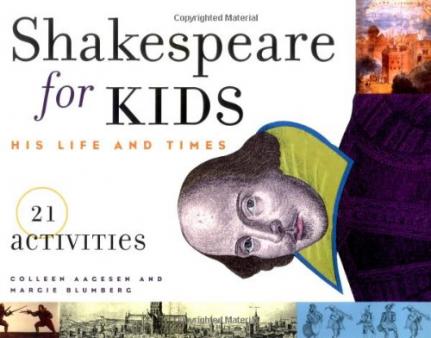
Shakespeare stories rewritten for children
Shakespeare's famous stories have been reworded and illustrated for different ages and offer a great introduction to his classic plays.
We love these five series, or look through our Best Shakespeare stories for children guide :
- Short, Sharp Shakespeare Stories
- Shakespeare Children's Stories
- Shakespeare Stories from Orchard Books
- Usborne: Shakespeare's plays retold for children
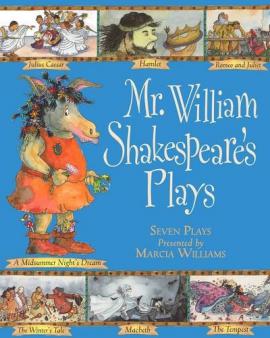
Find out more:
- Watch a BBC Bitesize KS1 animation about William Shakespeare
- The Royal Shakespeare Company's Shakespeare Learning Zone offers loads of information on Shakespeare's plays, including key facts, key scenes, pictures from past productions and videos of actors and directors working on and performing the plays
- Download a visual timeline of the major events in Shakespeare’s life and Elizabethan England
- Find out why Shakespeare is famous in a CBBC Newsround guide
- A children's introduction to Shakespeare from DKfindout!
- Join historian Greg Jenner for a BBC Sounds kids' homeschool history lesson about William Shakespeare
- Discover Shakespeare's life and work through numbers
- Watch clips and play games on CBBC's Shakespeare page
- Find out about the world that Shakespeare lived in with fact pages about playhouses, writing plays and more
- 15 top Shakespeare facts from National Geographic Kids
- Look at primary sources about Shakespeare , including his will and information about his taxes
- See an animated "life of Shakespeare" video for children
- Look through some of the Shakespeare portraits in the National Portrait Gallery
See for yourself
- Visit Shakespeare’s birthplace in Stratford-upon-Avon to find out more about his life
- At Shakespeare's Schoolroom & Guildhall you can explore classroom where Shakespeare studied between the ages of 7 and 14, find out about the kind of lessons he went to and even try some Tudor homework!
- While you’re in Stratford-upon-Avon , see where Shakespeare is buried at the Holy Trinity Church
- A replica of the Globe Theatre was built in London near the spot where Shakespeare’s theatre stood. You can visit in person or take a virtual tour if you can't get there in person!
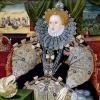
Give your child a headstart
- FREE articles & expert information
- FREE resources & activities
- FREE homework help

- Works Plays Play Synopses Poetry A Shakespeare Timeline Study Resources Authorship
- Life Biography Shakespeare's Will
- Historical Elizabethan England Historical Scholarship The Globe Shakespeare's Language
- Performance Scenes and Monologues Theatre Companies
- SRC Features Articles and Features Shakespeare's Grammar Speech Analysis Blogs and Podcasts Reading List Other Links Ask the Bard!
- Site Info About Us Contact Us Copyright Notice Privacy Policy Site Map
Thank you for visiting the Shakespeare Resource Center. You'll find here collected links from all over the World Wide Web to help you discover William Shakespeare. There are millions of pages that reference Shakespeare on the Internet. This site aims to make it a little easier to find the most useful ones.
The e-mail policy of the Shakespeare Resource Center is simple: the SRC will not provide answers to questions about homework, paper topics, interpretations, etc. The purpose of this site is to provide links to aid you in your online Shakespeare research; it's not meant to provide you a personal research assistant. But for the most burning questions, why not Ask the Bard ?
You can also follow the Shakespeare Resource Center on Facebook and Twitter for daily updates of news, pages, and other timely items of interest. And if you're in need of a book, movie, or other Shakespeare-related merchandise, your Amazon.com purchase helps support the site. Enjoy!
Copyright © 1997–2023, J. M. Pressley and the Shakespeare Resource Center Contact Us | Privacy policy
Display Settings
Welcome to the display settings! Click the "Get Started" button below or use the buttons above to choose which setting(s) you want to change.
Get Started
Select your preferred typeface/font from the list below.
Next Setting
Colour Theme
Select your preferred colour theme.
Select the text size that you find the easiest to read.
Letter Spacing
Line height.
The Great Fire of London was a fire that was so big that it burned nearly all of the buildings in London, with the exception of the Tower of London as that was made from stone, and stone doesn't burn up easily.
All settings are saved automatically and can be changed at any time. What do you think of this feature?
7th September 2016

William Shakespeare
To be or… not to be. That is the question. But our question today isn’t “to be or not to be.” It’s what not many of us know about Shakespeare, such as his childhood, school, where he went to university etc.
William Shakespeare was born on the 23rd April 1564 in Stratford Upon Avon. His childhood home is still there today- and is now open for everyone to see.
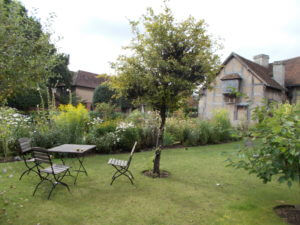
His father, John Shakespeare, was a glove-maker and made all kinds of gloves in his workshop on the ground floor. The window, now facing the shops on the high street, was where he sold all his gloves. It was a trading location at the time, and it still is!
Back in the Tudor era, you had to have a licence for all trading sectors, such as selling food or clothes. John had a licence for glove making.
To find out more about the Tudor era, click here .
His education
Because John Shakespeare was the Earl of Stratford (which is equivalent to the Mayor of Stratford) he got William a place in the local grammar school for free. If Shakespeare had gone to a different school, we may not know him as the famous playwright today…
From the age of 6 or 7, for 6 days of the week, at 6am he went to the local grammar school, which is still there today.
He left at the age of 14. He didn’t go to university because he was going to pay off his father’s debts. His works may not have been the same if he went to university. Who knows?
His inspiration for his plays
We don’t know where he got his inspiration from, but we do know that it would have been from the time he spent helping his father pay off debts.
Here comes the bride!
In 1582, when he was 18 years old, he married 26-year-old Anne Hathaway. She was already three months pregnant with her first child by the time Shakespeare married her.
They both had three children and had them baptised. The children being baptised was the last record of Shakespeare for seven years. By this time, Shakespeare had gone down to London to get a job. He was, at first, an actor. The next time he was recorded was when he had written his first play.
Let’s write some plays!
In 1589-1590, Shakespeare wrote Henry VI Part One on this year. A year later, he wrote Henry VI Part Two and another year later, Henry VI Part 3 . But it wasn’t until 1598 when he was actually credited for writing the plays.
Building the Globe
By 1599, Shakespeare was both famous and very rich thanks to the writing of his plays. By this point, Shakespeare was one of the people who owned Lord Chamberlain’s Men.
3 thoughts on “ William Shakespeare ”
What do you think about this?
Good evening. Thanks for this info! Love your blog!
Great information
Comments are closed.
- International
- Schools directory
- Resources Jobs Schools directory News Search

Shakespeare Homework Booklet
Subject: English
Age range: 14-16
Resource type: Worksheet/Activity
Last updated
29 June 2018
- Share through email
- Share through twitter
- Share through linkedin
- Share through facebook
- Share through pinterest

Creative Commons "Sharealike"
Get this resource as part of a bundle and save up to 33%
A bundle is a package of resources grouped together to teach a particular topic, or a series of lessons, in one place.
The Tempest
A range of resources focused on The Tempest with homework tasks, contextual information and assessment tasks (both reading and writing) mostly aimed at KS3.
Your rating is required to reflect your happiness.
It's good to leave some feedback.
Something went wrong, please try again later.
lydia_millar13
Empty reply does not make any sense for the end user
missrichardsenglish
Report this resource to let us know if it violates our terms and conditions. Our customer service team will review your report and will be in touch.
Not quite what you were looking for? Search by keyword to find the right resource:
Analysis of William Shakespeare's Sonnet 18: Famous Love Poem
- Trent Lorcher
- Categories : Literature study guides and chapter summaries
- Tags : Homework help & study guides
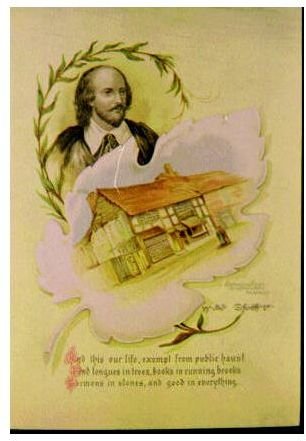
Sonnet 18 by William Shakespeare
Shall I compare thee to a summer’s day? Thou art more lovely and more temperate: Rough winds do shake the darling buds of May, And summer’s lease hath all too short a date: Sometime too hot the eye of heaven shines, And often is his gold complexion dimm’d; And every fair from fair sometime declines, By chance or nature’s changing course untrimm’d; But thy eternal summer shall not fade Nor lose possession of that fair thou owest; Nor shall Death brag thou wander’st in his shade, When in eternal lines to time thou growest: So long as men can breathe or eyes can see, So long lives this and this gives life to thee.

The rhyme scheme of a Shakesperean sonnet is abab cdcd efef gg .
A Shakespearean sonnet consists of three quatrains (four lines grouped together) and a couplet. Each quatrain is one unit of thought in the poem, similar to a paragraph in prose. The ending couplet comments on the preceding three quatrains.
An analysis must take into account the general structure of a Shakesperean sonnet (and you thought poems about love were all about love).
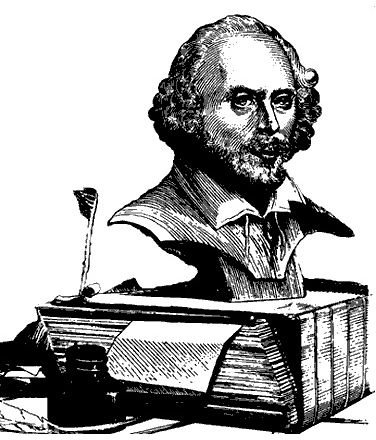
An analysis of Sonnet 18 produces the following obervations:
- The poem begins with a simple question: “Shall I compare thee to a summer’s day?” It’s a yes/no question that evokes a 13 line “no” and explains why with, ironically, a comparison to a summer’s day.
- The first four lines, grouped together by rhyme and content, explain that summer is intemperate, too windy, and too short, neither of which fits the object of the poem (not a lover, by the way, but the person you give this to doesn’t need to know this). The off rhyme of “temperate” in line 2 and “date” in line 4 draws attention to the notion that summer is finite, which contrasted with the eternal nature of poetry, highlights the poem’s theme that love/friendship is eternal.
- The next four lines, grouped together by rhyme and content, assert that summer is “Sometime too hot” and causes a decline in appearance, something that does not suit the object of the poet’s admiration.
- This incongruity between summer and “thee” is explained in the next four lines: “thy eternal summer shall not fade / Nor lose possession of that fair thou owest.”
- Line 12 concludes that a poem makes for a better comparison because “in eternal lines to time thou growest.”
- The poem’s final couplet erases any doubt the reader may have about the eternal nature of the tribute, explaining that “as long as men can breathe or have eyes to see, So long lives this (Sonnet 18) and this gives life to thee.”
This post is part of the series: Love Poems
The love poem you wrote probably isn’t very good. These are.
- Famous Love Poems: An Analysis of “How do I Love Thee” by Elizabeth Barret Browning"
- An Analysis of Sonnet 18 by William Shakespeare
- Shakespeare Sonnet 13 Analysis
- Sad Love Poems: An Analysis and Summary of the Prologue to Romeo and Juliet
- Dazzle Billions with Your Knowledge of Hyperbole

IMAGES
VIDEO
COMMENTS
William Shakespeare is often praised as the world's greatest playwright . Though he lived 400 years ago, his plays are still studied and enjoyed today.
Top 10 facts. William Shakespeare was born in Stratford-upon-Avon in April 1564. Shakespeare's wife's name was Anne Hathaway. Shakespeare had three children: Susanna, Hamnet and Judith. Shakespeare worked as actor with the Lord Chamberlain's Men, later called the King's Men. Shakespeare wrote 154 sonnets and around 40 plays.
Studying Shakespeare is easy with CliffsNotes. Read the summaries of Shakespeare's plays such as Henry V, Romeo and Juliet, Hamlet, A Midsummer Night's Dream and many more! Ace your tests, get homework help, and understand Shakespeare's plays and poetry with FREE CliffsNotes summaries, character analyses, glossaries, quotes, essays, filmography, and more.
Welcome! Thank you for visiting the Shakespeare Resource Center. You'll find here collected links from all over the World Wide Web to help you discover William Shakespeare. There are millions of pages that reference Shakespeare on the Internet. This site aims to make it a little easier to find the most useful ones.
Help your child to understand Shakespearean idioms with this handy resource. They will draw the literal meaning of the Shakespearean idiom, then write the real meaning. Use these Romeo and Juliet Dominoes to help you have fun, while learning the main characters. William Shakespeare Homework Help for Kids
1 min. Updated: 31st January 2023. This William Shakespeare Hotspots activity is a fun and interactive way to learn important facts about the great poet and playwright. Use this Fact File to brush up on your knowledge of the Bard. Try working through this Shakespeare reading comprehension activity . This worksheet is a great way to understand ...
4.6 (5 reviews) William Shakespeare Day KS2 Assembly Pack. 4.8 (6 reviews) William Shakespeare Identify the Idiom Blether Stations. Romeo and Juliet Characters Stick Puppets. 4.9 (9 reviews) Globe Theatre KS2 Fact File. 5.0 (4 reviews) A Midsummer Night's Dream Wedding Invitation Letter Template.
William Shakespeare was born on the 23rd April 1564 in Stratford Upon Avon. His childhood home is still there today- and is now open for everyone to see. ... Homework Help For Kids is a website that provides information to help you with your piles of homework. We've been doing this since 2013, with this website and an app created in 2016.
Top 10 William Shakespeare Facts for Kids. Some of his plays were written for the King and included references to his personal interests, such as magic and witches. Female roles were played by boys or young men. It wasn't until the Restoration period, later in the 17th Century, that women were allowed to perform on stage.
Introduction to William Shakespeare Section 1 of 1 Objective The student will identify important events in William Shakespeare's life. A Famous Life Shakespeare continues to be the most well-known English playwright. You might already know that the details of his life story are under debate. Some critics believe Shakespeare was actually a female, a group of men writing under a fake name, or ...
William Shakespeare Questions and Answers - Discover the eNotes.com community of teachers, mentors and students just like you that can answer any question you might have on William Shakespeare
William Shakespeare. Articles Animals Arts and Literature Earth and Geography History Life Processes Living Things (Other) Philosophy and Religion Plants Science and Mathematics ...
William Shakespeare Quiz for Kids. 3 min. Updated: 31st January 2023. Work through these William Shakespeare quiz questions to see how much you know about the famous playwright and poet! What is William Shakespeare's nickname? Why were female roles in Shakespeare's plays performed by boys or young men?
The Tempest. A range of resources focused on The Tempest with homework tasks, contextual information and assessment tasks (both reading and writing) mostly aimed at KS3. £4.00. An A5 sized booklet for easy use with planners with three homework tasks based on Shakespeare. Tasks are project-based and include research, creative making and writ.
Homework Help ; Teacher Resources ; Start free trial Sign In Start an essay Ask a question William Shakespeare. Start Free Trial ... William Shakespeare (1564-1616) lived concurrent with the ...
Start your 48-hour free trial to get access to more than 30,000 additional guides and more than 350,000 Homework Help questions answered by our experts. Get 48 Hours Free Access Already a member?
One of William Shakespeare 's greatest tragedies, Hamlet, Prince of Denmark, was written about 1599-1601. The five-act play was first published in a quarto edition in 1603. Shakespeare's telling of the story of Prince Hamlet, who after much hesitation avenges the murder of his father, derives from several sources.
William Shakespeare Fact File. Here are even more amazing facts about William Shakespeare and his work: 1. Shakespeare's plays have been translated into every major language; that's over 100 languages! 2. The longest play William Shakespeare wrote is Hamlet. It has over 4,000 lines and the actor who plays Hamlet will have to learn to ...
This analysis examines Sonnet 18 by William Shakespeare along with a brief introduction dealing with a general sonnet structure. Learn to dissect and analyze this classic love poem. ... Science facts homework help (244) Secular non secular homeschool curriculum reviews (108) Social studies help cultures governments more (209) Software reviews ...
Learn about William Shakespeare's early boyhood and path to London to become a playwright and actor. Shakespeare's birthplace. This image also in: Scholars Stratford-upon-Avon; 2:33. See an illustrated manuscript of 16th-century coats of arms, including commentary on whether Shakespeare is worthy of one.
See a production highlights from William Shakespeare's "Macbeth" focusing the horror elements of the play. This video also in: Students Macbeth; Students teaching Shakespeare; Students William Shakespeare; 0:29. Watch the Weird Sisters conspire in the opening scene of William Shakespeare's tragedy Macbeth.